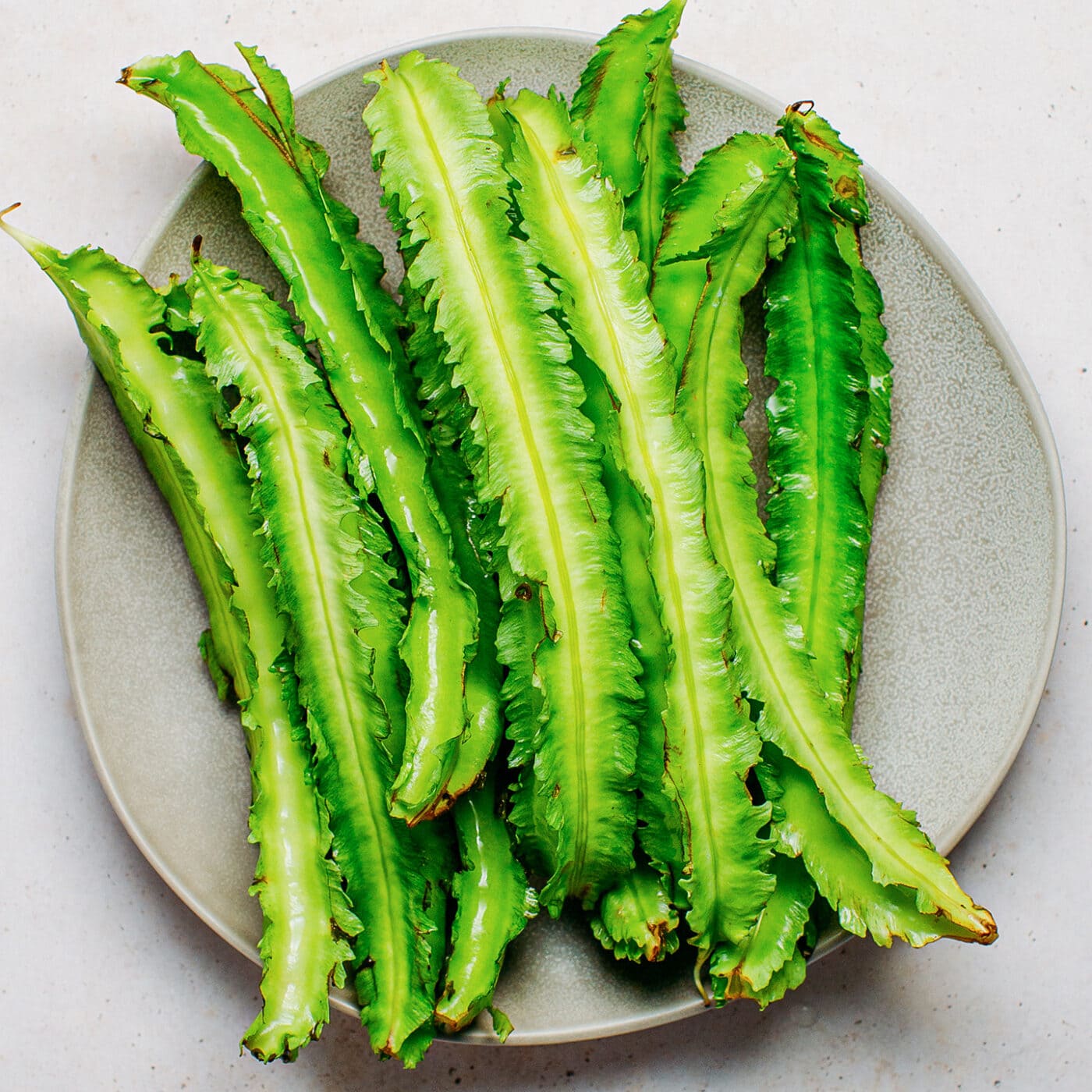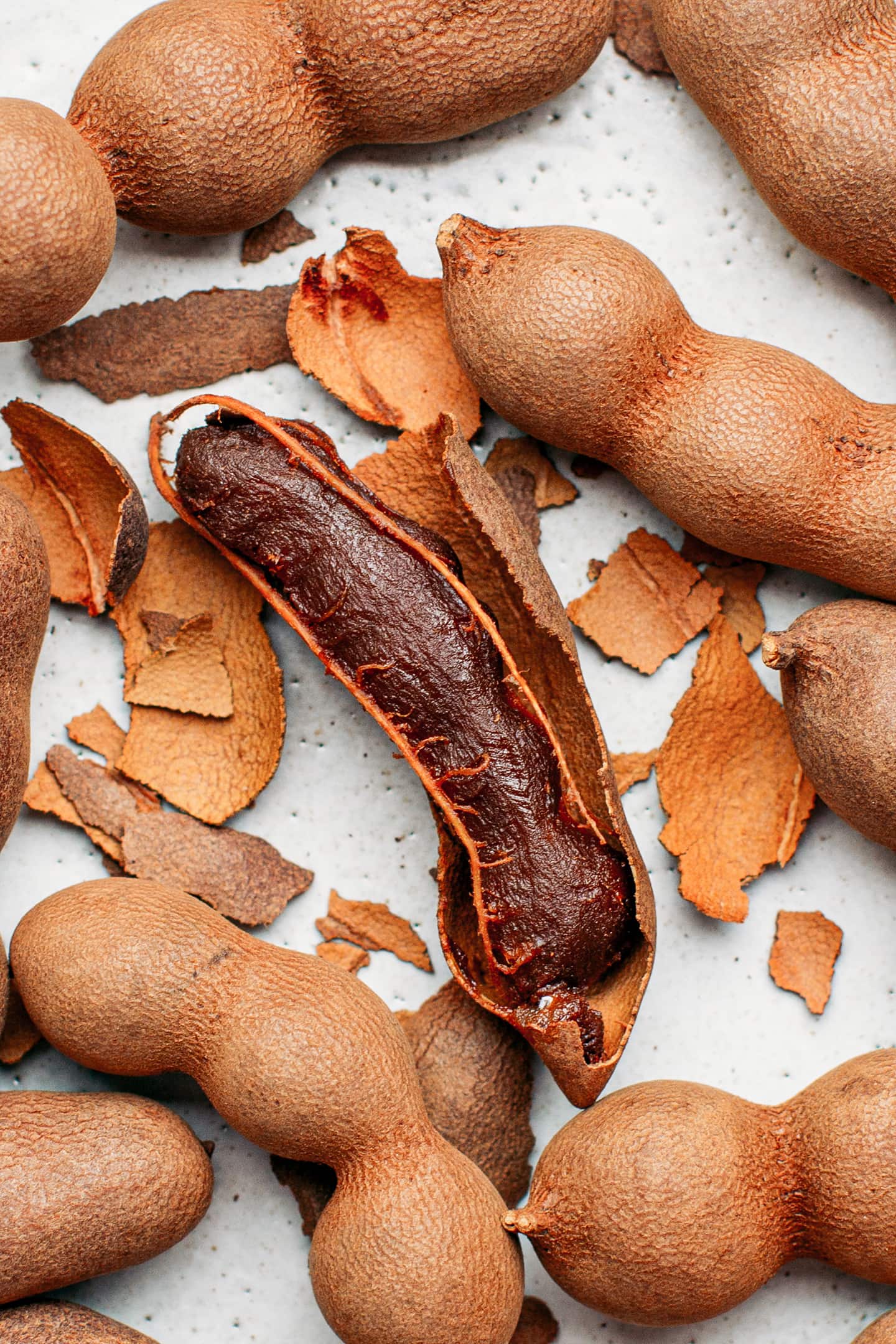This post may contain affiliate links. Please read our disclosure policy.
Here is everything you need to know about winged beans! Learn how to pick the freshest beans, how to prepare them, and how to cook them. This uncommon vegetable is delicious, crunchy, rich in nutrients, and super versatile!

Have you ever heard about winged beans? This strange-looking vegetable is popular overseas but still highly underappreciated in many countries. Let’s be honest; it’s a shame because winged beans are a fantastic vegetable! It’s fresh, crunchy, and healthy and can be used in many dishes, from soups to salads and stir-fries. Here is everything you need to know about it.
📘 What Are Winged Beans
The Winged bean, also known as dragon bean, goa bean, or manila bean, is a tropical plant that is widely used in Asia (especially Indonesia, Thailand, Malaysia, and Vietnam) and Latin America. It grows well in hot and humid climates.
Surprisingly, all the parts, from the leaves to the tubers and seeds, are edible! In this article, we will focus on the pods.
How to Pick Winged Beans
Picking the freshest ones is essential to get the best flavor; think fresh and subtly sweet. Here is what to look for:
- Check the color: fresh winged beans should have a bright green color. Stay away from beans that have a yellowish hue; these are usually not fresh.
- Check the texture: they should be firm and have a smooth surface.
- Make sure there are no brown or black spots: while they usually tend to have subtle brown spots on the edges (it can be hard to find extra fresh ones), there shouldn’t be too much. The less, the better.
🔪 How to Prepare It
Clean them
- Cover the winged beans with cold water and let them soak for about 5 minutes.
- Next, drain and rinse the beans 2-3 times under cold water. You may have to slightly rub the beans with your hands to remove any remaining dirt.
- Transfer to a plate lined with kitchen paper towels to dry them.
After cleaning the beans, take a closer look at each one and cut off the parts that may have some holes.

Slice them
Cut off the stems and slice the pods diagonally into ½-inch thick slices. The way you slice them doesn’t really matter. You can slice them straight or even make slightly larger slices.


🥣 How to Cook It
Sauté
Heat a tablespoon of oil in a large non-stick skillet over medium heat. Once hot, add minced garlic and cook for 1 minute. Next, add the sliced winged beans and sauté for 1-2 minutes. Deglaze the skillet with a couple of tablespoons of water and cook one more minute. This step will also steam the beans.
Season with salt and pepper, and serve!
Check out this recipe: Garlic Winged Beans.
Quick Tip: Avoid overcooking
To keep their bright color and crunchiness, you do not want to overcook them. Sautéing for just 2-3 minutes is largely enough. If you sauté them for too long, they will develop a slightly bitter flavor.
Steam
Arrange the sliced winged beans in a steamer basket and steam for 3-5 minutes. Season with salt and pepper, and serve.
Boil
Bring a large pot of water to a boil. Once boiling, add the sliced winged beans and let simmer for about 2 minutes. Drain and season with a pinch of salt.
Bake
Slice them into 1-inch thick slices and transfer them to a baking sheet lined with parchment paper. Drizzle with oil and season with salt, pepper, and minced garlic. Stir to coat and bake for about 10 minutes at 400°F (200°C).
Seasoning Winged Beans
Winged beans will taste bland without the proper seasoning, so make sure to always season your beans generously with the following:
- Salt and pepper: These are mandatory! Taste and adjust the saltiness to your liking.
- Sugar: Optional. A pinch of sugar helps balance the saltiness.
- Lemon juice: While optional too, a squeeze of lemon and a sprinkle of finely chopped lemon zest take the beans to another level! It’s fresh and citrusy!

If you are unsure about how to serve winged beans, think of these as an alternative to green beans or asparagus. You can use them in the following:
- Stir-fries: Simply add these to your favorite veggie stir-fries. You can also stir winged beans into stir-fried noodles or simply serve them as a topping or a side with steamed white rice.
- Soups: Add the winged beans near the end of cooking and let simmer for another 2-3 minutes.
- Salads: Raw. These will bring a crunchy texture and bright green color to your salads. Check out the FAQ section to learn how to prepare raw ones.
📙 Nutritional Value
Winged beans are low-calorie, high in fiber, and quite rich in protein compared to other vegetables. Per 100g (3.5 ounces) of winged beans:
- 49 calories
- 0.8g of fat
- 4.3g of carbohydrates
- 8g of fiber
- 6.9g of protein
🩺 Health Benefits
According to Legume Science, an international journal focused on legume research, winged beans are:
- Rich in vitamins A and C: With over 18 mg of vitamin C per 100g, fresh winged beans are a natural antioxidant. Research has shown that a diet rich in vitamin C can help reduce aging, protect the skin, and prevent certain types of cancers.
- Contains folate (66 µg/100g): Folate, a natural form of vitamin B9, is said to help maintain good brain health, lower the risk of stroke, and improve blood sugar regulation. It is also an essential nutrient needed during pregnancy.
- Rich in Tryptophan (0.25 g/100g): This helps reduce headaches and lower stress levels.
💬 FAQ
Yes, they can be eaten raw. They are particularly delicious served in salads, bringing crunchiness and freshness. Simply soak them in lightly salted water for 10-15 minutes and rinse them a few times before using. Note: I recommend slicing the beans very thinly if used in salads.
They have a very mild flavor with a subtle sweetness.
Most Asian supermarkets have them either in the produce aisle or the refrigerated section.
Once your beans are clean and completely dry, transfer them to an airtight container and store them in the refrigerator. You can then keep them for up to 2 days.
❄️ How to Freeze It
- Clean and slice your winged beans.
- Bring a large pot of water to a boil. Prepare a large bowl of ice-cold water.
- Blanch them in boiling water for about 2 minutes.
- Use a slotted spoon to transfer the beans to the bowl of ice-cold water immediately. Let them soak for 2-3 minutes.
- Transfer the beans to a plate lined with a clean kitchen towel to drain. Pat them dry before arranging them on a clean baking sheet.
- Freeze until firm before transferring to a freezer bag or container.


Want to Save This Recipe?
Enter your email below & we’ll send it straight to your inbox! Plus, you will receive new recipes every week!
I’d like to receive more tips & recipes from Full of Plants.
This site is protected by reCAPTCHA and the Google Privacy Policy and Terms of Service apply.

How to Cook Winged Beans
Ingredients
- 10 (170 g) medium winged beans pods
- 1 tbsp (15 ml) oil
- 2 cloves of garlic
- 2 tbsp water
- salt and pepper to taste
Instructions
Clean the beans
- Soak the winged beans in cold water for about 10 minutes. Next, drain and rinse the beans 2-3 times under cold water. You may have to slightly rub the beans with your hands to remove any remaining dirt.
- Transfer to a plate lined with kitchen paper towels to dry them.
Slice the beans
- Cut off the stems. Then, slice the winged beans diagonally into ½-inch thick slices.
Sauté
- Heat the oil in a large non-stick skillet over medium heat. Once hot, add the garlic and cook for 1-2 minutes, or until fragrant.
- Add the sliced winged beans to the skillet and sauté for 1 minute over medium heat. Next, add the water and cook for another 1-2 minutes. Season with salt and pepper, and serve immediately!
Notes
- Check the color: fresh winged beans should have a bright green color. Stay away from beans that have a yellowish hue, these are usually not fresh.
- Check the texture: they should be firm and have a smooth surface.
- Make sure there are no brown or black spots: while winged beans usually tend to have subtle brown spots on the edges (it can be hard to find extra fresh ones), there shouldn’t be too much. The less, the better.
Nutrition

About the Author
Thomas Pagot is the founder, photographer, and recipe developer behind Full of Plants. He created the blog in 2016 as a personal cookbook for vegan recipes. Through years of recipe development, Thomas has successfully grown Full of Plants into a trusted resource for plant-based recipes.




Leave a Comment
This is a good help for me. I don’t how to prepare winged beans but like to eat it. Thank you for sharing Thomas.
Please give us some less exotic dishes you seem to have gone all out Asian and some of us can’t get these ingredients.
I understand that not all recipes can please everyone and that’s completely okay. However, we try to post a mix of different recipes (from simple to more complex and inspired from different cultures/countries) so everyone can pick what they prefer. As you can see in our latest recipes, we still post very simple ones made with easy-to-find ingredients.
Thank you for sharing with us!!! This article was so informative. My mom sometimes buys this “mystery” vegetable to cook for us, but I have to admit that I didn’t know much about it until I read your article today.
I’m happy to hear you enjoyed this guide!